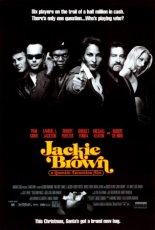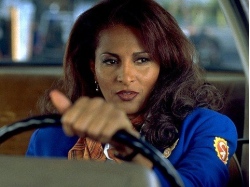
 First impressions can be deceiving. I first saw Jackie Brown during its theatrical release and, coming three years after Quentin Tarantino’s revelatory Pulp Fiction, this two-and-a-half-hour follow-up seemed indulgent and sluggish. Even Tarantino’s agent at the time reportedly griped to Miramax execs after the premiere, “There’s the ultimate case for not giving the director final cut.”
First impressions can be deceiving. I first saw Jackie Brown during its theatrical release and, coming three years after Quentin Tarantino’s revelatory Pulp Fiction, this two-and-a-half-hour follow-up seemed indulgent and sluggish. Even Tarantino’s agent at the time reportedly griped to Miramax execs after the premiere, “There’s the ultimate case for not giving the director final cut.”
But, like the two protagonists at the film’s crux, Jackie Brown improves greatly with age. Viewed far from the imposing shadow of Pulp Fiction, it stands as perhaps Tarantino’s most emotionally meaty work, as soulful as The Delfonics and Bobby Womack songs that punctuate its soundtrack.
 That doesn’t mean it isn’t also a hell of a lot of fun, brimming with dark humor, film-geek references, show-off set pieces and Tarantino’s patently quirky dialogue. Most notable, however, is that the writer/director snags outstanding performances from two beloved icons of 1970s B movies: Pam Grier and Robert Forster.
That doesn’t mean it isn’t also a hell of a lot of fun, brimming with dark humor, film-geek references, show-off set pieces and Tarantino’s patently quirky dialogue. Most notable, however, is that the writer/director snags outstanding performances from two beloved icons of 1970s B movies: Pam Grier and Robert Forster.
Based on Elmore Leonard’s Rum Punch, the crime thriller takes off when L.A. baddie Ordell Robbie (Samuel L. Jackson in full-on badass mode) whacks an underling (a mercifully quick appearance by Chris Tucker) before the guy can turn informant. A series of circumstances leads to Jackie Brown (Grier), a down-on-her-luck flight attendant who is one of Ordell’s smugglers. All this and Robert De Niro taking bong hits with Bridget Fonda’s leggy surfer girl.
Grier is smart, sexy and dangerous in the title role, but for my money, it’s Forster who damn near steals the picture as Max Cherry, a world-weary bail bondsman whose fate bumps into Ordell and Jackie. Forster makes plain, no-frills decency seem downright cool, and his performance — even-keeled, relaxed, laconic — is pitch perfect. —Phil Bacharach

When I first saw this movie, I liked it more than PF. Years later, I still like it, but PF is back on top as being a better movie.
Just saw the above verison of the movie and now JB (TFSV) is the best QT film ever!
Until the KILL BILLs, I always argued this was Tarantino’s best movie. The last two scenes rank amongst my favourites of all time–starting with the heartbreaking sadness of Max’s inability to leave the lonely life he’s become accustomed to and then ending with Jackie’s triumphantly moving realization that she has at last made her way across 110th street.
I still rank Forster’s performance in this as one of the five best I’ve ever seen. That scene where he buys the Delfonics tape to sing along with in his car, knowing she likes the group, gives me joyous goose bumps for some reason.